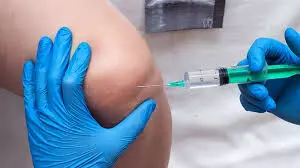Long acting injection of Fluticasone promising in knee osteoarthritis, reveals research

Long acting injection Fluticasone promising in knee osteoarthritis suggests a new study published in the The Lancet Rheumatology.
Corticosteroids are among the few effective treatments for knee osteoarthritis, but short duration of action limits their utility. EP-104IAR, a long-acting formulation of fluticasone propionate for intra-articular injection, optimises the action of fluticasone propionate through novel diffusion-based extended-release technology. The SPRINGBOARD trial assessed the efficacy, safety, and pharmacokinetics of EP-104IAR in people with knee osteoarthritis. SPRINGBOARD was a randomised, vehicle-controlled, double-blind, phase 2 trial done at 12 research sites in Denmark, Poland, and Czech Republic. We recruited adults aged 40 years or older with primary knee osteoarthritis (Kellgren–Lawrence grade 2–3) who reported Western Ontario and McMaster Universities Osteoarthritis Arthritis Index (WOMAC) pain scores of at least 4 and no more than 9 out of 10. Participants were randomly assigned (1:1) to receive one intra-articular dose of 25 mg EP-104IAR or vehicle control. Randomisation was done via interactive web-based access to a central predefined computer-generated list with block size of six (allocated by clinical site). Participants and assessors were masked to treatment allocation. Participants were followed up for 24 weeks. The primary outcome was the difference between groups in change in WOMAC pain score from baseline to week 12, analysed in all participants who were randomly assigned and received treatment. Safety, including laboratory analyses, and pharmacokinetics from quantification of fluticasone propionate in peripheral blood were assessed in all participants who received a dose of randomly assigned treatment. A person with lived experience of knee osteoarthritis was involved in study interpretation and writing of the report. Findings: Between Sept 10, 2021, and Nov 16, 2022, 1294 people were screened for eligibility, and 319 were randomly assigned to EP-104IAR (n=164) or vehicle control (n=155). One participant in the EP-104IAR group was excluded from all analyses because treatment was not administered due to an adverse event. 318 participants (135 [42%] male and 183 [58%] female, 315 [99%] White) received randomly assigned treatment and were included in the primary analysis and safety analysis (EP-104IAR, n=163; vehicle control, n=155). At week 12, least squares mean change in WOMAC pain score from baseline was –2·89 (95% CI –3·22 to –2·56) in the EP-104IAR group and –2·23 (–2·56 to –1·89) in the vehicle control group, with a between-group difference of –0·66 (–1·11 to –0·21; p=0·0044); a significant between-group difference persisted to week 14. 106 (65%) of 163 participants in the EP-104IAR group had one or more treatment-emergent adverse event compared with 89 (57%) of 155 participants in the vehicle control group. Effects on serum glucose and cortisol concentrations were minimal and transient. There were no treatment-emergent deaths or treatment-related serious adverse events. Plasma concentrations of fluticasone propionate showed a blunted initial peak with terminal half-life of approximately 18–20 weeks. These phase 2 results suggest that EP-104IAR has the potential to offer clinically meaningful pain relief in knee osteoarthritis for an extended period of up to 14 weeks, longer than published data for currently marketed corticosteroids. There were minimal effects on glucose and cortisol, and stable fluticasone propionate concentrations in plasma. The safety and efficacy of EP-104IAR will be further evaluated in phase 3 trials, including the possibility of bilateral and repeat dosing with EP-104IAR.
Reference:
Efficacy and safety of a diffusion-based extended-release fluticasone propionate intra-articular injection (EP-104IAR) in knee osteoarthritis (SPRINGBOARD): a 24-week, multicentre, randomised, double-blind, vehicle-controlled, phase 2 trial
Malone, Amanda et al. The Lancet Rheumatology, Volume 0, Issue 0
Keywords:
Long, acting, injection, Fluticasone, promising, knee, osteoarthritis, The Lancet Rheumatology, multicentre, randomised, double-blind, vehicle-controlled



